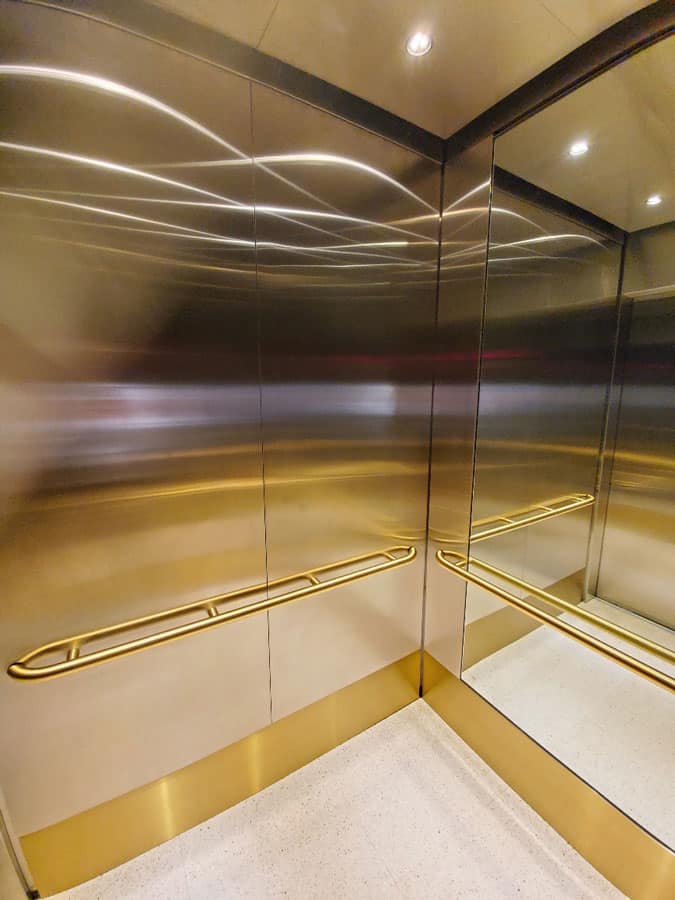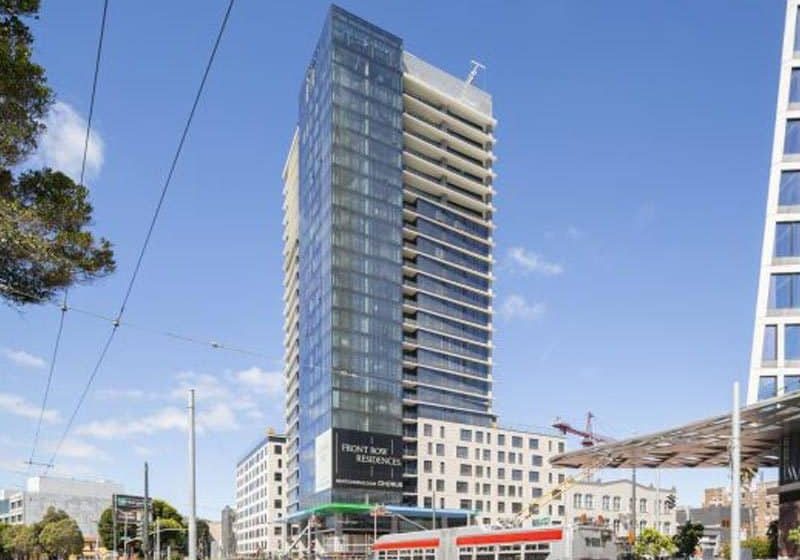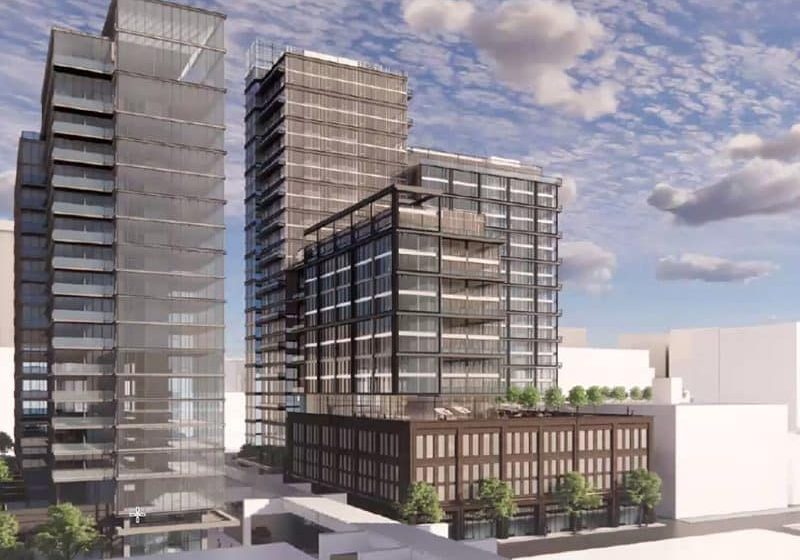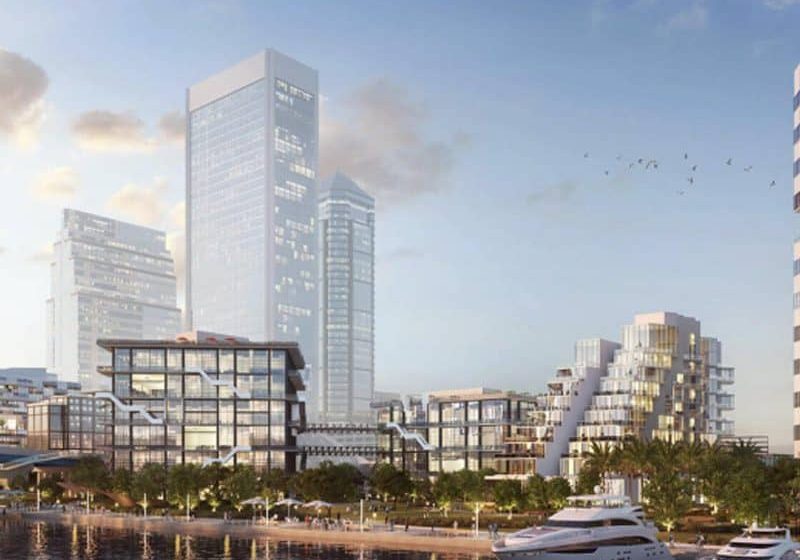Rock Solid
Aug 1, 2021
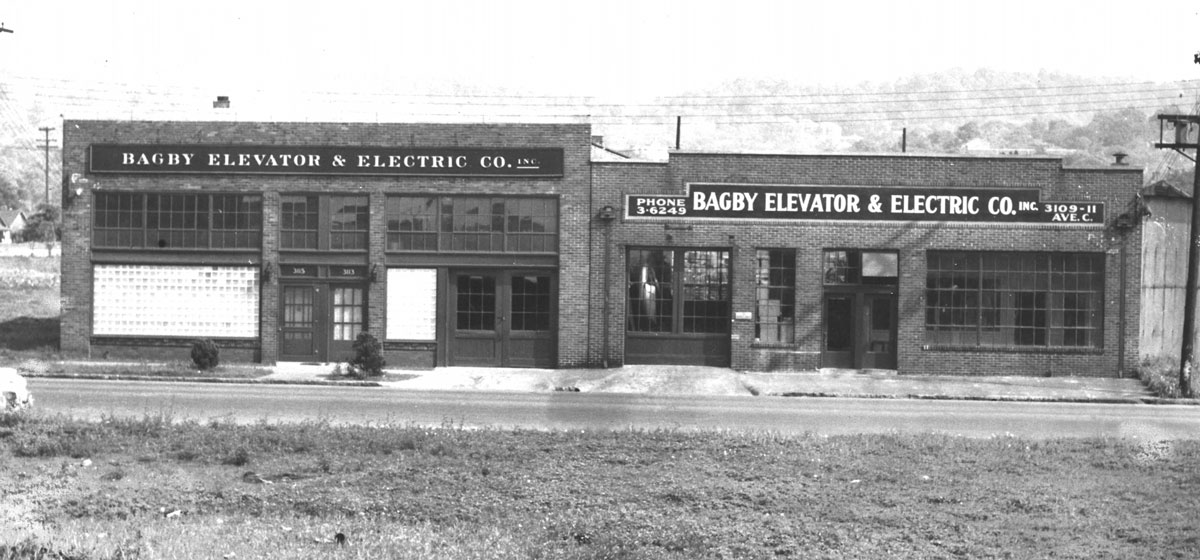
Alabama-based Bagby Elevator has steadily grown into a Southeastern powerhouse.
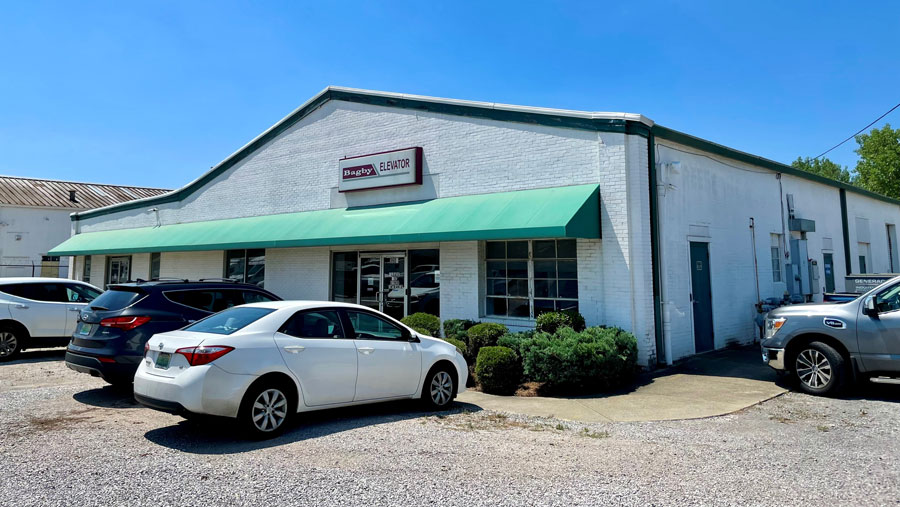
The Birmingham headquarters now 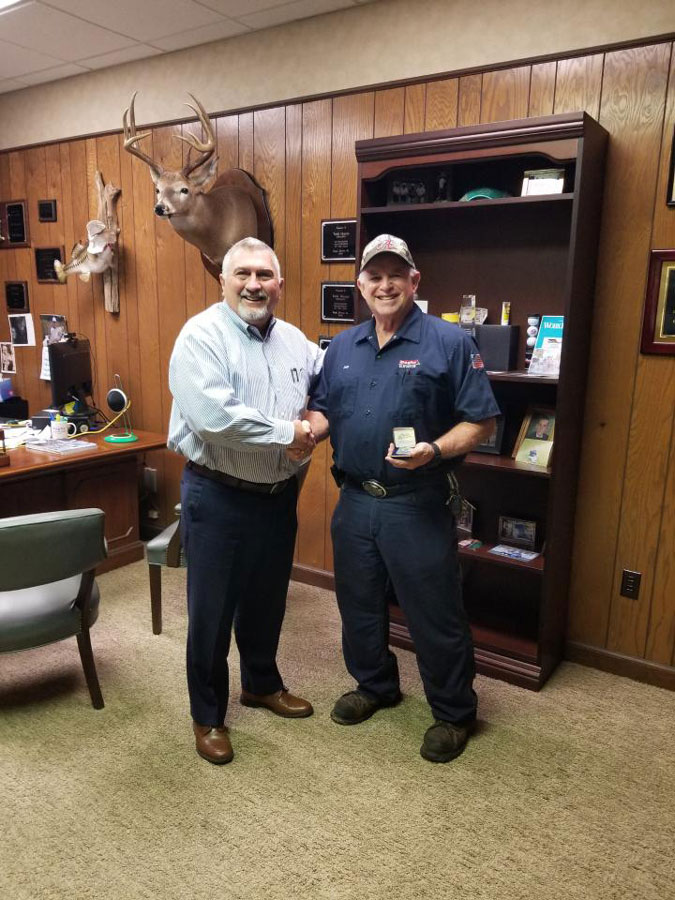
(l-r) Southern Division Vice President Todd Sharpe, based in Mobile, presents a “Golden Eagle” solid gold coin to employee Jeff Lister on his 25th year employment anniversary. Bagby Elevator Executive Vice President Hunter Bagby says presenting the gold coins is one of his favorite parts of the job.
In the midst of the pandemic, the 100th anniversary of Bagby Elevator Co., Inc., came and went unceremoniously in 2020. There was no cake or champagne at the Birmingham, Alabama, headquarters as the company continued to serve its customers, which range from residential to commercial to industrial throughout the Southeast and beyond. In June, Executive Vice President/company attorney Hunter Bagby said:
“We’re blessed with great customers and great employees. I know, for some time, it was quite a scary and certainly stressful time for everybody — particularly our commercial/hospitality customers — but everybody got through it. Our commercial customers are going strong now, and certainly, all of our customers in the industrial sector never missed a beat.”
“The Pittsburgh of the South,” Birmingham would not exist if not for the plentiful coal, limestone and iron ore necessary for steel production that resulted in its birth and fueled its explosive growth — which earned it another nickname: The Magic City. Today, the city has diversified, with healthcare and banking on relatively equal footing as heavy industry, Hunter Bagby observes.
Bagby Elevator evolved and diversified along with its hometown and the greater Southeast region. Its deep industrial roots shielded it from effects of the pandemic, Hunter Bagby says, elaborating:
“Industrial customers such as those involved in power generation, chemical, petroleum and paper industries are very important parts of our economy and society. It happens that industrial work accounts for a quarter of the work we do. So, given their substantial needs during coronavirus shutdowns, we were busier than ever.”
Hunter’s great-grandfather, Arthur P. Bagby Sr., incorporated Bagby Elevator and Electric Co., Inc., in Birmingham in 1920. The company’s growth kicked into high gear in the decades after World War II, on pace with “the vigorous industrial development of the South,” according to a 1966 Bagby brochure. Illustrated with scores of photographs of notable projects — what was then the Communicable Disease Center in Atlanta (now the Centers for Disease Control), various hospitals and medical facilities in Birmingham, the National Aeronautics and Space Administration (NASA) in Huntsville, Alabama; and numerous textile mills and retailers, to name a few — the brochure stated:
“Bagby is in an excellent position to participate in the tremendous expansion of industry in business in the South and Southeast. A record of the company shows its remarkable versatility. Bagby’s projects include a long list of satisfied customers. On this list are churches, office buildings, commercial establishments, textile mills, finishing plants, newspapers, chemical and synthetic-fiber plants, hospitals, institutional buildings and many assignments for NASA.”
It happens that industrial work accounts for a quarter of the work we do. So, given their substantial needs during coronavirus shutdowns, we were busier than ever.”
Bagby Elevator Executive Vice President Hunter Bagby
Evolution of a Family Company
Of Bagby Sr.’s three children (Arthur P. Bagby Jr., Milton B. Bagby and Katherine Bagby Robertson), Arthur Jr. and Milton, as well as some of their children, have been involved in the business. In 1980, Arthur P. Bagby III eldest son of Arthur P. Bagby Jr., purchased the elevator assets from Bagby Elevator & Electric Co., renaming the outfit Bagby Elevator Co., Inc. It was at this time ownership of Bagby Electric Co. transferred to Arthur P. Bagby Jr., until his passing in 1986. His middle son, Charles P. Bagby, continued in the electrical business until he retired in the 2000s. Bagby Elevator and Electric were eventually merged again, with the company continuing as Bagby Elevator Co. “Now, we’re just an elevator company,” Hunter Bagby said. “It’s been a nice living for us.”
Through the generations, the Bagby family and its employees have served many of the same clients. Systems it has serviced for at least a half century include Ladd Office Park in the Birmingham suburb of Mountain Brook (65 years; the oldest office park in the U.S.); a residential Inclinator® Elevette® unit in Greenville, Alabama (55 years); an office tower in Birmingham (50 years) and a college in Huntsville, Alabama (50 years).
Bagby entered the marine sector more than 20 years ago. “I’m hopeful that our marine division will continue to prosper,” Hunter Bagby says. Involving roped hydraulic systems, that work is performed on vessels including ferry boats, crew boats and paddlewheel casinos from Asia to the U.S. Gulf Coast.
Bagby Elevator still has customers in the mining and steel industries, including in the Birmingham and Mobile areas. But customers are located throughout the Southeast, Hunter Bagby says, observing:
“Different industries began to feature heavily since the mid-20th century in the Southeastern U.S. The number of rivers in the region is conducive to power generation and heavy industry, generally. Perhaps what is especially unique in our area is the growth of the timber and paper industries. The paper industry has substantial demand for VT. So, we have transitioned our industrial business towards fulfilling the VT needs of industries that presently exist.
“Industrial customers often have specific demands in terms of the size and scope of the applications needed. Additionally, given the nature of their use, substantial and speedy repairs are often necessary. As Bagby has our own shops throughout the region, we are able to quickly meet those needs.”
Changing economic tides saw some clients, such as textile mills and print newspaper facilities, fall by the wayside, but many things about Bagby Elevator today and when it published that brochure remain the same. Case in point: Versatility, which was emphasized in the 1960s brochure, is still very much in force today, and what sets Bagby apart, Hunter Bagby says. When asked what he considers the company’s “bread and butter,” he says it’s “whatever our customers need.” He continues:
“That said, we are probably more focused on industrial than most companies. It just depends on the market. In rural Alabama and Mississippi, for example, we have more industrial than commercial and multifamily work. There are home, hotel and office-building elevators in our portfolios there, but not as much as in other areas. We always try to be versatile and respond to market needs.”
Steady Expansion
By the mid-1960s, Bagby had offices in Birmingham and Huntsville, Alabama; Atlanta; and Paducah, Kentucky. There were approximately 50 employees. Today, that has doubled to 100 employees in offices throughout the Southeast covering: Panama City, Fort Walton Beach, Destin, Pensacola, Navarre and Perdido, Florida; Biloxi/Gulfport, Columbus, Tupelo, Meridian, Starkville and Corinth, Mississippi; Nashville, Chattanooga, Lawrenceburg, Lewisburg and Cleveland, Tennessee; Dallas/Fort Worth, Wichita Falls, Denton, Tyler and Borger, Texas; New Orleans, Baton Rouge, Houma and Bogalusa, Louisiana; and 11 cities, including Atlanta, in Georgia.
In addition to the Alabama headquarters, Bagby maintains offices in Mobile, Montgomery, Gadsden, New Orleans and Dallas. Bagby also handles custom engagements in the states of Washington and Alaska.
More than half of Bagby’s employees are based in Alabama. As Bagby is a union shop, its pipeline of employees comes from there. The company is currently hiring apprentices and mechanics, and Hunter Bagby says his main concern is a tight labor market and replacing longtime employees who will likely be retiring soon. Many managers have been in place for decades, including Keith Gaut (40 years), David Hutton (27 years), Steve Taylor (39 years) and Donnie Hicks (31 years). That list of long-tenured employees also includes Southern Division Vice President Todd Sharpe, who has been with the Mobile office for nearly 40 years.
Based in an approximately 10,000-ft2 facility a stone’s throw west of downtown Mobile, Sharpe’s job entails managing a staff of 25-30 who serve customers from New Orleans to Panama City, Florida. The shop is busy, evidenced by the array of elevators and components from Bagby’s longtime industry partners that occupy nearly every square inch of floorspace. These partners include:
- EMS Group
- Elevator Equipment Corp.
- SnapCab
- Innovation Industries, Inc.
- Smartrise
- Motion Control Engineering
- GAL/Hollister-Whitney, a Vantage company
As for the next five years and beyond, Hunter Bagby anticipates steady growth. That’s due in large part, he says, to its dedicated employees, many of whom, like Sharpe, have been with the company for decades. Hunter Bagby says:
“The elevator industry is, at the end of the day, about the technicians you employ. It is very much a local business. Meaning the great things you do elsewhere typically mean very little to the customer who needs their elevator back in service today. We are fortunate to have numerous folks who have guided and provided great service to their customers and wonderful examples to their colleagues.”
Get more of Elevator World. Sign up for our free e-newsletter.



